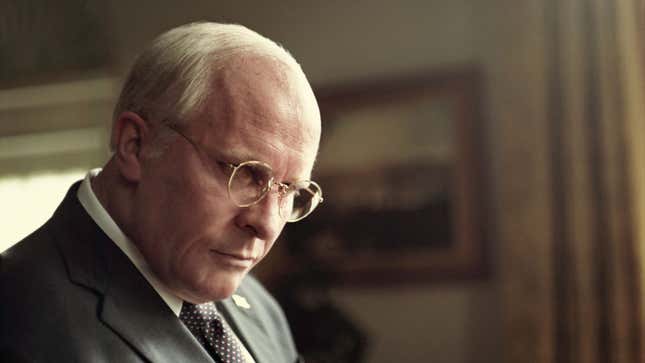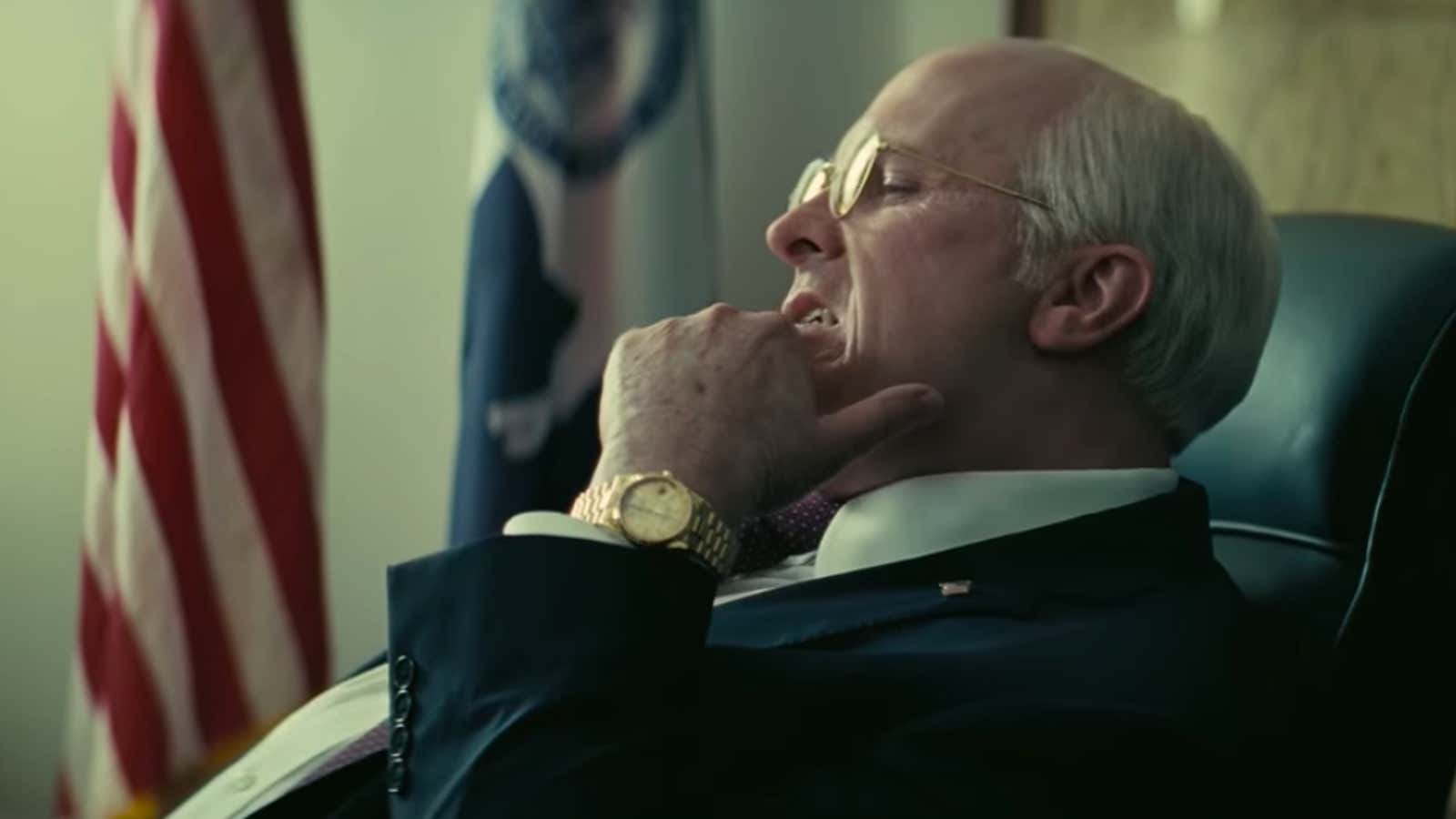Vice, the new Dick Cheney biopic from The Big Short director Adam McKay, is not a great film. It’s a confused, often self-indulgent jumble of satirical gimmicks. It can’t decide if it wants to be a parody or a serious drama, settling awkwardly between the two. That it’s not an especially impressive movie is all the more disappointing given the talent involved, from McKay to Christian Bale to Amy Adams.
And, yet, it’s still one of the most politically and culturally necessary films of the year.
At a time when the world is pretending to forget the failures and injustices of former US president George H.W. Bush’s administration just because he died; when reputable publications are fawning over his son, George W. Bush, because he, too, is no longer in power; when the New York Times is publishing op-eds arguing that what America really needs is more White Anglo-Saxon Protestants like Cheney and the Bushes, then, yes, it might be time for a big, accessible Hollywood reminder that their time in American politics is not worthy of any nostalgia.
Despite its warm reception by Golden Globes voters, the critical reaction to Vice has been less positive. It currently has a middling 66% on Rotten Tomatoes, proving how divisive the film is among critics since the review embargo was lifted on Monday (Dec. 17).
Most of the negative reviews point out that the movie is a mess; that it’s never sure exactly what it wants to say about how Dick Cheney schemed his way into becoming the most powerful vice president in US history—other than that is a thing that happened. It’s hard to argue with either of those points.
I take issue, however, with the notion that the film doesn’t delve into Cheney’s psychology or even attempt to arrive at some understanding of his malice. It does. Just because it’s a relatively simple answer, and not some huge revelation, doesn’t mean it’s wrong or doesn’t exist in the film.
Dick Cheney is a bad person. A bad person who got a taste of power and discovered he loved the feeling it gave him. It filled a gaping hole in what the film shows was an otherwise laughably mediocre life. Then Cheney exploited a loophole in American democracy to grow that power exponentially.
It’s a similar kind of power that drives CEOs to exploit, harass, and torment those under them, that prompts police officers to so quickly and easily use lethal force on innocent people. Not always, but it’s usually a mediocre white man of privilege who sees this opportunity to control other people. The American presidency isn’t immune to that impulse. That McKay sticks to that message, rather than play armchair psychologist and try to diagnose some other grand unifying theory about the motivation for Cheney’s evil, is one of Vice‘s few narrative successes.

The other popular refrain among critics is that Americans don’t “need” a movie like this, that it doesn’t tell us anything we don’t already know. “What are we supposed to take away from the movie that we didn’t bring in?” is a question being asked by journalists who also go to great lengths to display their already-nuanced understanding of the Bush era. (The word “we” is doing a lot of work in that sentence.)
Vice is not just for well-informed journalists and critics who are already well aware of Cheney’s role in lying the US into a devastating war, among other horrors. The invasion of Iraq happened over 15 years ago. An entire generation of global citizens have grown up since then. Vice, flawed as it is, is not meant only to preach to the liberal choir of 2018 (though it does do that). It’s also for global posterity. With each passing year it becomes more vital that our culture documents and preserves the record of how Dick Cheney and George W. Bush bamboozled the world into chaos.
As you’ll know if you watched the trailer for the film, it hinges on how the two came to a “different understanding” of the separation of duties between the president and vice president, vesting in Cheney vastly more power than others in his role before him. Some critics have written that Vice absolves Bush (played by Sam Rockwell), but it doesn’t. In fact, the film depicts Bush first as a black-sheep son who just wants to impress daddy, and then as a knowing accessory to Cheney’s machinations. I don’t see how you can come away from Vice thinking it’s soft on Bush. The former president is depicted as totally willing to hand the keys to the kingdom over to Cheney—one of the most catastrophic errors in the history of the American presidency—and then eager to go along with the vice president’s plans at every turn.
And even for those who claim to know the story already, there is value in seeing an artistic depiction of these actions be done, in witnessing a (mostly) informed dramatic recreation of the maneuvers, conversations, and deceits an actual human being pulled off in order to wield such terrible power. (McKay reportedly read a slew of historians’ accounts of the administration and the War on Terror, including Barton Gellman’s must-read Angler.) Watching this play out on screen is different from hearing the story on the news or reading a thread on Twitter. It’s a far more visceral experience.
It helps that Bale is so completely convincing as the former vice president. In one of his famously extreme body transformations, the actor gained a significant amount of weight for the role, and he perfectly mimics Cheney’s unassuming, near-whisper of a speaking voice.
Though not always effective, Vice is efficient: It manages to cover a lot of ground for a two-hour movie, from Cheney’s early days as an unelected official in Washington, to his shady accounting practices when head of the oil industry giant Halliburton, to how he immediately saw the Sept. 11 terrorist attacks as an opportunity to act on his and many Republicans’ fantasy of invading the Middle East. The film shows his numerous draft deferments, his fight against environmental protection, his close relationship with former US secretary of defense Donald Rumsfeld (Steve Carell).

And, of course, there are the heart attacks. Throughout Vice, Cheney’s heart keeps trying to kill him—as if, the film suggests, it’s a biological failsafe to prevent the man from becoming too powerful. But Cheney lives on. After a heart surgery in 2010, Cheney technically lived without a pulse for a year.
Ultimately, despite Vice‘s focus on the events specific to Cheney’s life, the film is an indictment of the modern American Republican party. Cheney, the man, isn’t particularly remarkable. Here, he’s just the vessel for a larger story about a political party that heartlessly toyed with American democracy for decades, starting with the Richard Nixon administration and culminating with Bush-Cheney, before making way for a new kind of evil. Cheney was the constant. Personally responsible for it all? No. But emblematic of a more widespread poison still afflicting America today? Absolutely.
The horror of Vice and of American politics writ large is that there are many more people like Dick Cheney lurking in the shadows. Unlike the current US presidential administration, power is not always incompetent. Sometimes it is brutally efficient.
It’s a shame Vice couldn’t be something more than what it is. But it still matters. It’s still a story Americans should never forget.
